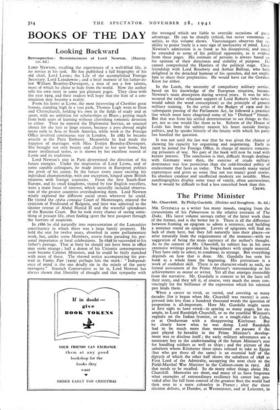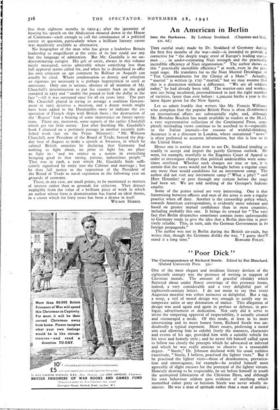The Prime Minister
Mr. Churchill. By Philip Guedalla. (Hodder and Stoughton. 8s. 6d.)
MR. GUEDALLA as a writer has many moods, ranging from the coruscations of his Palmerston to the relative restraint of The Duke. His latest volume savours rather of the latter work than of the former, and is the better for it. There is all the difference between framing an epigram to adorn a sentence, and building a sentence round an epigram. Lovers of epigrams will find no lack of them here, but they fall naturally into their places—or arise naturally from the requirements of the moment—with no suggestion of being the main currency of the author's thought. As to the content of Mr. Churchill, its subject has in his own extensive writings provided his biographers with ample material. They have only to select, to condense, to arrange. But everything depends on how that is done. ivir. Guedalla has seen his book as a whole from the beginning. His portraiture is a work of confident skill. There is no character-study as such, no formal assessment of the Prime Minister's' statesmanship or his achievements as orator or writer. Yet all that emerges insensibly from the narrative. Mr. Guedalla is content to let the facts tell their story, and they tell it, of course, very much the more con- vincingly for the brilliance of the expression which his talented pen lends them.
When a career so vivid, so varied, and covering so many decades (for it began when Mr. Churchill was twenty) is com- pressed into less than a hundred thousand words the question of proportion is all-important. Here Mr. Guedalla might seem at first sight to have erred—in sparing so many pages, for ex- aniple, to Lord Randolph Churchill, or to the youthful. Winston's exploits on the Indian frontier, or as a rough-rider in Cuba, or at Omdurman with a disapproving Kitchener. But he clearly knew what he was doing. Lord Randolph had to be much more than mentioned en passant if the part played by heredity in the Prime Minister's develop- ment was to disclose itself ; the early military adventures are a necessary key to the understanding of the future Minister's zest for handling soldiers as well as ships ; and the picture of the subaltern whom Kitchener three times refused to take to Egypt (but who got there all the same) is an essential half of the diptych of which the other half shows the subaltern of 1898 as First Lord of the Admiralty, occupying the next chair to the Field-Marshal. War Minister in the Cabinet-room in 1915. All that needs to be recalled. So do many other things about Mr. Churchill. Memories are short, and many of us have forgotten what examples of extraordinary resiliency his career has pro- vided after the fall from control of the greatest fleet the world had then seen to a mere. colonelcy in France ; after the three election defeats, at Dundee, at Westminster, and at Leicester, in . less than eighteen months in 1922-4 ; after the ignominy of hearing his speech on the Abdication shouted down in the House. of Commons—each enough to call the continuance of a political career in question, particularly when a brilliant literary career was manifestly available as alternative.
No biographer of the man who has given a leaderless Britain leadership so magnificent at the crisis of its fate could use any but the language of admiration. But Mr. Guedalla is no un- discriminating eulogist. His gift of satire, always in this volume nicely measured, serves admirably where something less than full approval seems called for, and when he is disinclined to offer his own criticism an apt comment by Balfour or Asquith can usually be cited. Where condensation so drastic and selection so rigorous are necessary it is perhaps hypercritical to cavil at omissions. Only one is serious, absence of all mention of Mr. Churchill's determination to put his country back on the gold standard in 1925 and " enable the pound to look the dollar in the face "—till it was outstared once for all six years later. The part Mr. Churchill played in trying to arrange a coalition Govern- ment in 1910 deserves a mention, and a dozen words might have been added to the Dardanelles story to indicate the co- operation of French ships with British there ; the destruction of the ' Bouvet ' had a bearing of some importance on future opera- tions. There are, moreover, some aspects of the earlier Churchill which get too little notice. Just after finishing Mr. Guedalla's book I chanced on a pertinent passage in another recently pub- lished work (not on the Prime Minister): " Mr. Winston Churchill, now President of the Board of Trade, braved the dog- day heat of August to 'make a speech at Swansea, in which he calmed British anxieties by declaring that Germany had nothing to fight about, no prize to fight for, no place to fight in ; r and we rejoice as a nation in everything bringing good to that strong, patient, industrious people.' " That was in 1908, a year which Mr. Guedalla finds suffi- ciently signalised by entry into the Cabinet and marriage ; but he does full justice to the opposition of the President of the Board of Trade to naval expansion in the following year on grounds of economy.
These, in any case, are small points, to be mentioned as matters of interest rather than as grounds for criticism. They detract negligibly from the value of a brilliant piece of work in which an author whose forte is dramatisation has found an ideal theme, in a career which for forty years has been a drama in itself.
WILSON HARRIS.



























 Previous page
Previous page